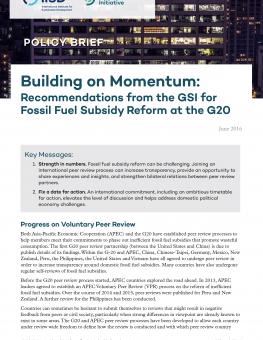
Building on Momentum: Recommendations from the GSI for Fossil Fuel Subsidy Reform at the G20
This policy brief examines the progress made to phase-out inefficient and wasteful fossil fuel subsidies, the increasing momentum behind subsidy reform in international processes and the steps needed to ensure that the commitment is met.
G20 Energy Ministers meet on the 29th of June in Beijing to discuss the major energy policy challenges facing the group. A key area of discussion is fossil fuel subsidy reform.
Since 2009 the G20 has maintained a commitment to phase out inefficient fossil fuel subsidies that promote wasteful consumption. In advance of this meeting, the GSI published this policy brief examining progress made to phase out inefficient and wasteful fossil fuel subsidies, the increasing momentum behind subsidy reform in international processes and the steps needed to ensure that the commitment is met.
Participating experts
You might also be interested in
What the G7 Ministerial Could Have Delivered on Fossil Fuel Subsidies Reform
The G7 climate, energy, and environment ministers’ meeting in Turin fell short when it came to breaking the 15 years of gridlock on fossil fuel subsidies. Here are three ways the G7 can use their next meetings to demonstrate measurable progress.
G20 Finance Ministerials and World Bank/IMF Spring Meetings: Expert comment
G20 finance ministerials and World Bank/IMF spring meetings will take place this week in Washington. High on the agenda is the need to mobilize trillions of dollars of investment in the transition to clean energy.
IISD Applauds Canada’s Reaffirmation to End Domestic Public Finance for Fossil Fuels in Budget 2024
Today's federal budget announcement delivers new measures to support affordability and reaffirms Canada’s commitments on climate action.
Experts Call on G7 to Get Serious on Fossil Fuel Subsidy Reform
At this month’s G7 meetings, ministers need to close the loopholes and show they are serious about tackling fossil fuel subsidies.